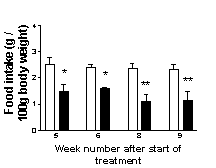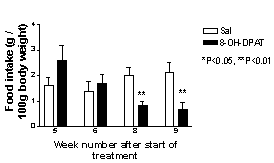| pA2 online © Copyright 2004 The British Pharmacological Society |
014P
University of Buckingham 3th Focused Meeting April 2004 |
|
The effects
of chronic administration of fluoxetine on 8-OH-DPAT-induced hypophagia
in rats |
|
It has previously been demonstrated that the 5HT1A receptor agonists inhibits food intake in hungry rats or non-deprived rats given highly palatable (see Ebenezer et al., 2003). It is also been reported that chronic administration of serotonin reuptake inhibitors (SSRIs), such as fluoxetine, desensitise both pre- and postsynaptic 5HT1A receptors (see Pejchal et al., 2002). The present study was undertaken to investigate whether chronic administration of fluoxetine would affect the hypophagic effects of 8-OH-DPAT in rats given palatable food. Male Wistar rats (b.wt. 300 - 340g; n=16) were randomly divided into 2 equal groups. Rats in Group 1 (Control Group) were injected i.p. once daily with physiological saline solution for 28 days (Weeks 1 - 4), while rats in Group 2 (Treatment Group) were injected i.p. once daily with fluoxetine (10 mg kg-1). On the two days following chronic treatment (i.e. week 5), the animals in both groups were injected s.c. with either saline or 8-OH-DPAT (100 µg kg-1) and placed singly in experimental cages with free access to a palatable mash (see Ebenezer et al., 2003 for details) and food intake measured for 30 min. Each rat received both treatments in a cross-over fashion over the two days. The results were analysed by ANOVA with post-hoc Tukey test. A similar experimental design was used to assess the effects of saline and 8-OH-DAPT in these animals on weeks 6, 8 and 9. The results obtained are illustrated in Fig.1. The rats treated chronically with fluoxetine lost approximately 15% of their body weight over the 28 day treatment period compared with those chronically treated with saline (data not shown). 8-OH-DPAT significantly inhibited cumulative food intake in the rats in the Control Group during weeks 5, 6, 8 and 9 (Fig. 1A). By contrast, 8-OH-DPAT did not significantly affect feeding in the rats in the Treatment Group during weeks 5 and 6, but significantly decreased feeding during weeks 8 and 9 (Fig. 1B).

Fig
1A. The effects of 8-OH-DPAT on food
intake in rats that had been chronically treated
with saline (Control Group)

Fig
1B. The effects of 8-OH-DPAT on food
intake in rats that had been chronicaly
treated with fluoxetine (Treatment Group)
The results show that chronic administration with fluoxetine abolishes the suppressant effects of 8-OH-DPAT on food intake in rats fed a palatable diet during the two week period (weeks 5 and 6) following cessation of treatment. This may be related to the desensitisation of 5HT1A receptors following chronic administration with fluoxetine. The subsequent hypophagic effects of 8-OH-DPAT in weeks 8 and 9 was probably due to re-sensitisation of 5HT1A receptors.
Arkle, M. et al.
(2000) Eur. J. Pharmacol., 408, 273 - 276.
Ebenezer, I.S. et al. (2003). Meth. Find. Expt. Clin. Pharmacol.,
in press.
Pejchal, T. et al. (2002) Br. J. Pharmacol.135, 1115 - 1122.